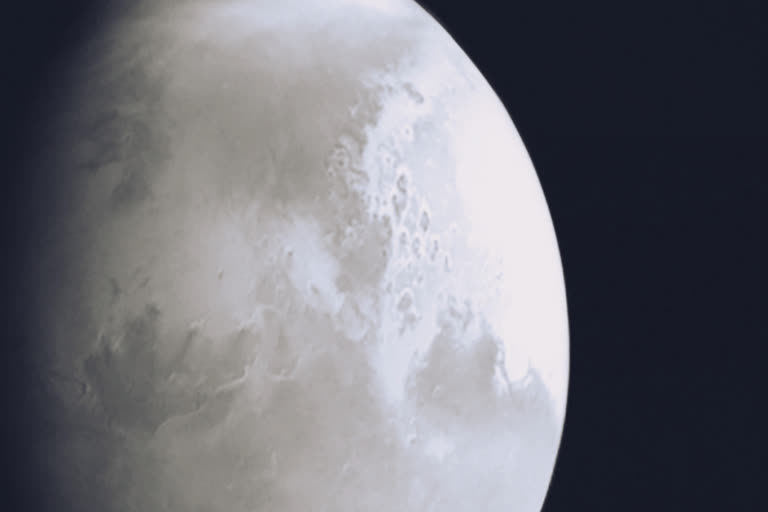Beijing: China's space probe Tianwen-1 has sent back the first image of Mars that it captured from a distance of 2.2 million km from the Red Planet.
The China National Space Administration (CNSA) has released the image of Mars captured by Tianwen-1, Xinhua reported on Friday.
The probe conducted its fourth orbital correction on Friday, Feb 5 at 8 pm, aiming to ensure that the probe achieves a sound planned rendezvous with Mars. The probe has traveled about 197 days in orbit, flying about 465 million km.
It is currently 184 million km from Earth and 1.1 million km from Mars. All probe systems are in good working condition, the CNSA said.
China launched the Mars probe on July 23, 2020, on a Long March-5 rocket from the Wenchang Spacecraft launch site in south China's Hainan province. The Tianwen-1 probe, weighing about 5 tonnes, consists of an orbiter, a lander, and a rover.
The probe completed its first orbital correction on August 2, second on September 20 and third on October 28 last year. It is set to enter Mars orbit on February 10. After entering the Mars orbit, it will spend around three months surveying potential landing sites, using a high-resolution camera to prepare for the landing in May.
The most challenging part of the mission will be the soft landing, an autonomous process of the probe lasting seven to eight minutes, according to the CNSA.
The probe will use its aerodynamic shape, parachute, and retrorocket to decelerate and buffer legs to touch down.
After the landing, the rover will be released to conduct scientific exploration with an expected lifespan of at least 90 Martian days (about three months on Earth), and the orbiter, with a design life of one Martian year (about 687 days on Earth), will relay communications for the rover while conducting its own scientific detection.
Tianwen-1 means 'Questions to Heaven' and comes from a poem written by Qu Yuan (about 340-278 BC), one of the greatest poets of ancient China.
Also Read: This wearable device detects signs of burnout in sweat
ETV Bharat / science-and-technology
China's space probe captures first image of Mars
The image of Mars captured by China's space probe Tianwen-1 has been released by CNSA.The probe conducted its fourth orbital correction on Friday, Feb 5 at 8 pm, aiming to ensure that the probe achieves a sound planned rendezvous with Mars. The probe has traveled about 197 days in orbit, flying about 465 million km. Tianwen-1 means 'Questions to Heaven' and comes from a poem written by Qu Yuan (about 340-278 BC), one of the greatest poets of ancient China.

Beijing: China's space probe Tianwen-1 has sent back the first image of Mars that it captured from a distance of 2.2 million km from the Red Planet.
The China National Space Administration (CNSA) has released the image of Mars captured by Tianwen-1, Xinhua reported on Friday.
The probe conducted its fourth orbital correction on Friday, Feb 5 at 8 pm, aiming to ensure that the probe achieves a sound planned rendezvous with Mars. The probe has traveled about 197 days in orbit, flying about 465 million km.
It is currently 184 million km from Earth and 1.1 million km from Mars. All probe systems are in good working condition, the CNSA said.
China launched the Mars probe on July 23, 2020, on a Long March-5 rocket from the Wenchang Spacecraft launch site in south China's Hainan province. The Tianwen-1 probe, weighing about 5 tonnes, consists of an orbiter, a lander, and a rover.
The probe completed its first orbital correction on August 2, second on September 20 and third on October 28 last year. It is set to enter Mars orbit on February 10. After entering the Mars orbit, it will spend around three months surveying potential landing sites, using a high-resolution camera to prepare for the landing in May.
The most challenging part of the mission will be the soft landing, an autonomous process of the probe lasting seven to eight minutes, according to the CNSA.
The probe will use its aerodynamic shape, parachute, and retrorocket to decelerate and buffer legs to touch down.
After the landing, the rover will be released to conduct scientific exploration with an expected lifespan of at least 90 Martian days (about three months on Earth), and the orbiter, with a design life of one Martian year (about 687 days on Earth), will relay communications for the rover while conducting its own scientific detection.
Tianwen-1 means 'Questions to Heaven' and comes from a poem written by Qu Yuan (about 340-278 BC), one of the greatest poets of ancient China.
Also Read: This wearable device detects signs of burnout in sweat


